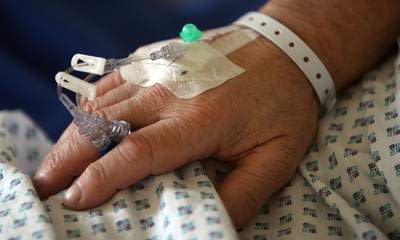More Hospital Deaths To Be Investigated

Nine more hospital trusts are to be investigated over their mortality rates, health officials have said.
The NHS Commissioning Board (NHS CB) said the nine trusts have stood out on the Hospital Standardised Mortality Ratio (HSMR) for two years in a row.
Last week medical director Sir Bruce Keogh announced five would be investigated. Nine more have now been added, which are:
::North Cumbria University Hospitals NHS Trust
:: United Lincolnshire Hospitals NHS Trust
:: George Eliot Hospital NHS Trust
:: Buckinghamshire Healthcare NHS Trust
:: Northern Lincolnshire and Goole Hospitals NHS Foundation Trust
:: The Dudley Group NHS Foundation Trust
:: Sherwood Forest Hospitals NHS Foundation Trust
:: Medway NHS Foundation Trust
:: Burton Hospitals NHS Foundation Trust.
Last week Sir Bruce said the five trusts to be probed were identified by the Summary Hospital-level Mortality Indicator (SHMI) as having higher than expected death rates.
Figures suggest there were 3,000 more deaths than expected at Colchester Hospital University NHS Foundation Trust, Tameside Hospital NHS Foundation Trust, Blackpool Teaching Hospitals NHS Foundation Trust, Basildon and Thurrock University Hospitals NHS Foundation Trust and East Lancashire Hospitals NHS Trust.
Sir Bruce promised a "thorough and rigorous" investigation.
"These hospitals are already working closely with a range of regulators. If there were concerns that services were unsafe the regulators should have intervened," he said.
"The purpose of my investigation is to assure patients, public and Parliament that these hospitals understand why they have a high mortality and have all the support they need to improve.
"This will be a thorough and rigorous process, involving patients, clinicians, regulators and local organisations."
The investigations came after Robert Francis QC's scathing report laid bare the"disaster" of Stafford Hospital.
His report's findings highlighted the "appalling and unnecessary suffering of hundreds of patients" between 2005 and 2009.
Patients were left for hours sitting in their own faeces, food and drink was left out of reach and hygiene was so poor that relatives had to clean toilets themselves.
But in his report, Robert Francis refused to point the finger at any organisation or individual, instead blaming an "insidious negative culture".
After Monday's announcement, Northern Lincolnshire and Goole chief executive Karen Jackson said: "Sir Bruce has stressed that this not an inspection but an improvement exercise.
"He aims to ensure hospitals have the support they need to improve so this review gives us an additional learning opportunity.
"Positive patient experience is at the heart of everything we do and we aim to continue with our focus on delivering high quality care for all our patients.
"What the mortality statistics do not demonstrate is the dedication from staff at all levels to the provision of safe, high quality care to patients in all of our hospitals."
A spokesman for Buckinghamshire Healthcare added: "Buckinghamshire Healthcare has recorded higher than average HSMR over the past two years and has focussed its efforts to understand why.
"Action plans have been put in place and we have seen an improvement in our mortality indicators year-on-year as a result.
"This has included our doctors reviewing deceased patient notes on a monthly basis and the establishment of a mortality task force, which looks at patient care, the patient experience and clinical coding."
Dr Craig Stenhouse, medical director at Burton Hospitals, said: "We welcome this opportunity of a review from independent sources regarding how our hospital is performing and believe it is of fundamental importance that these issues are openly and thoroughly investigated.
"The trust has already identified areas where there may be a higher than expected mortality and has taken proactive measures to review these services."
The Dudley Group chief executive Paula Clark said that current independent analysis shows that the trust is in the "expected range" for mortality ratios.
"Indeed the overall number of deaths continues to decline against the backdrop of an ageing population with complex health needs," she added.
"We take mortality indices very seriously and use them as a flag for further reviews of our care practices. This is one of a number of tools we use to assure ourselves of the quality of our care."
A spokesman for United Lincolnshire Hospitals NHS Trust welcomed the investigation, adding that the trust's mortality figures have "improved significantly" in the last year.
"We welcome the investigation into mortality indicators within our Trust and hope that it will provide an opportunity to demonstrate the progress that we have made on mortality thanks to the hard work of our staff," the spokesman said.
George Eliot Hospital NHS Trust's chief executive Kevin McGee added: "We've made significant improvements to our mortality rates over the past year and we welcome the opportunity to demonstrate our successes."
North Cumbria University Hospitals interim chief executive Ann Farrar said: "We have taken an open and transparent approach following concerns relating to our higher-than-expected mortality rate and put in place a comprehensive improvement plan to reduce this.
"This will take time. Our doctors and nurses are leading this improvement and we will be reporting progress at our monthly public trust board meetings."

 Yahoo News
Yahoo News 